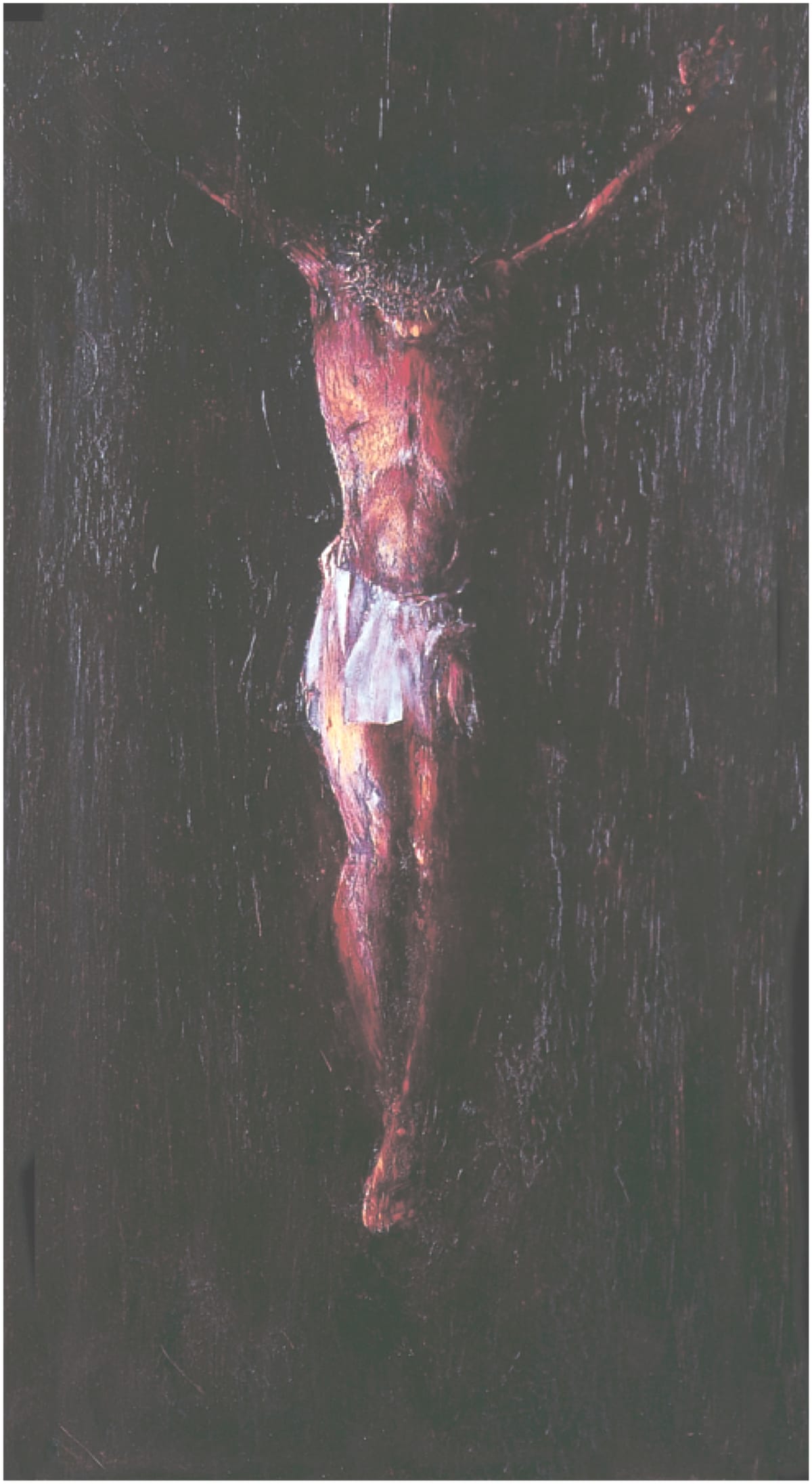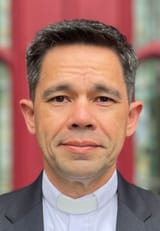Crossing: Apologetics of the King
From Rose (the anonymous anointer in the Pharisee’s home) to a choir from first-century Philippi to John Donne's iambic pentameter — does making the sign-of-the-cross mean anything?

Once upon a time, a bishop led people from his diocese on a Holy Land tour. One day, the itinerary included an all-day hike up Mount Hermon, the likely Mount of Transfiguration. When the hikers made it to the summit, they shared Midday Prayer from the Book of Common Prayer.
Upon reciting “I will lift up my eyes unto the hills; from whence comes my help?” the charismatic bishop interrupted the rest of Psalm 121 with the plea of his heart: “O Lord, here we are on your holy hill and we need your help!” He went on to lament the lack of adult baptisms and confirmations in his congregations and his having to close nearly as many congregations as there were new church plants.
Starting into the next psalm, number 124 — “If the Lord himself had not been on our side . . . when men rose up against us” — a lay leader interjected: “God, our enemies have risen up against us. Our country is in a tailspin.” She elaborated upon the immoralities du jour for several minutes, and complained about her misled friends on social media.
At the close of the last psalm, 126 — “He who goes on his way weeping and bears good seed shall doubtless come again with joy, and bring his sheaves with him.” — a deacon confessed, “Jesus, for all the good seed you’ve given us, we’ve little joy and certainly no sheaves to harvest.” He admitted feeling depleted and exhausted at trying to effectively evangelize and defend the faith.
Suddenly, before the group could say the Gloria Patri, a heavenly envoy (aka angel) appeared with a great cloud of witnesses. The envoy said, “Don’t fear. The One who hears has heard your prayers. Why do you doubt? Is anything too great for him? But he has sent us to tell you the answers you seek are before you.”
Adam was the first to address the hikers: “Don’t you remember when headquarters tapped us for the mission of a lifetime? But as soon as we got going, the Enemy struck. Not by affliction, but by enchantment. He exploited our diffidence about being suited and situated to pursue such a great task. His charm offensive got inside our heads and hearts. We started not only doubting who we were, but distrusting headquarters. Before we knew it, we were not only distracted and sidetracked but committing full-blown treason.”
And then Eve: “Don’t you see? We’ve all been parachuted into the center of the storm. We’ve all found ourselves in the midst of counter currents. But the Great-Commission Giver has never changed the Great Commission. The adventure has always been for God’s image-bearers to extend his good reign. This has been true for every generation of our sons and daughters, for the children of Noah, and for the heirs of Abraham and Sarah.”
King David came forward with a band. He introduced Song 37: “You know, I love Myles Coverdale. But ‘Fret not’ is too polite. What I was really warning against was falling into the temptation to flare our nostrils. So, here’s how it’s supposed to sound . . .”
After finishing, his percussionist, who turned out to be Asaph, stepped up to segue us into Song 73. He said: “The Enemy wants you to fixate on being plagued and troubled, embittered and pierced in this mortal life, so that you forget your neighbors are perishing and burning up for eternity. The Enemy wants you to be happy shuffling deck chairs while the world drowns. Don’t take the bait. The slain lamb is your victorious hero.”
When Asaph finished singing, someone in our group noticed Chaplain John P. Washington in the cloud softly chanting a “Kyrie Eleison,” not for himself obviously, but for us.
Paul the Ambassador sighed: “Foolish Christians! Who has deceived you? Like my own well-intended Pharisees, you have rejected the lost who fail to conform to your mold of evangelicalism.”
Teresa of Calcutta looked up at us to share her heart: “If the church thinks people need to be whole and holy before they enter the reign of God, the church will lead no one into Jesus’s loving embrace. The church will heal no one. So then, we should not be surprised if people look for love and healing in all the wrong places. If you will not be Christ’s hands and feet to love the unlovable, who will?”
A group came to the fore: “We were among the first generation of believers in Ephesus baptized by Paul. And yet it took us years until we were convicted to recognize our sorcery as evil. Only then did we volunteer to have a bonfire to destroy our incantation books — books that had made us rich in our gig economy. So we are proud to testify to God’s long-suffering, to his patience for the conversion of dispossessing ourselves of what once possessed us.”
“Hi,” said a lady softly. “I’m Rose, but you know me as the King’s anonymous anointer in the Pharisee’s home. When I had first observed Jesus in public, I was overwhelmed by his Godly grace and gravitas. I started looking for an opportunity to thank him, just for his willingness to be around the likes of me. One day when word spread that his host had snubbed him by a lack of hospitality, I immediately knew what to do. And when he called me to ‘Proceed in reconciliation,’ I was more than ready to give up my old life. He truly is the God who saw Hagar and Tamar and Rahab . . . his radical love is what transformed all of our lives.”
Peter the Ambassador stood up: “You know how many times I got it wrong. Not least of which was my ethnic bigotry. Even after I had witnessed Jesus healing and blessing so many non-Jews, even after the Holy Spirit used me to good-news cosmopolitan crowds, I still was a racial supremacist. In God’s humor, he interrupted my talking and I had to stand back as the Holy Spirit poured out his power on not only a goy, not only a Roman goy, but a Roman goy officer of Caesar’s empire. I could just hear Jesus laughing in heaven about that one.”
Joseph of Nazareth simply said: “God loves us so that he may rebuild us to be level, plumb, square, and true in alignment with him. He does not rebuild us so that he can love us.”
Paul spoke again: “King Jesus is not only your good news . . . he is your agenda. And if he is our agenda, we will not be preoccupied trying to convert people to strawmen. Jesus didn’t live and die for politics or power or an ideology. He was lynched by the lovers of those things — people who were willing to murder to protect their precious strawmen that demanded protection.”
Matthew the Christobiographer said: “Why do you think Mark and Luke and I passed down Jesus’s great warning? If the world will lynch its King, then his apprentices must be ready each day to be lynched. This is the Great Commission. This is how we fulfill the Great Commission.”
Aleksandr Solzhenitsyn added: “This is how we enter the existential drama of the world in crisis. Like our Lord. The Imposter tempts us to justify raping the world. The King shows us how to love his world.”
Søren Kierkegaard spoke: “The world, after all, is a subset of God’s Kingdom. It is his Creation corrupted — that part of his creation that is trying hard to do life free of God’s reign. And free of God’s reign, the world attempts to cobble together its own reign. But no mortal reign can defeat the diminishment of life into a vain death. If, however, we give our selves to the reign and agenda of the Eternal One, we have begun to abide in his eternal presence. And so, in giving our self: we find our self, we grow true relationships with others, we see the God who is self-giving, we enter into his eternal realm. And that is the only way we can be any earthly good.”
Leslie Newbigin opined: “As the Son of God, King Jesus’s suffering and self-sacrifice reveals who God is: the God who suffers with and for us. Thus, Jesus is the hermeneutic of God. And as the Son of Adam, Jesus’s willingness to submit with valor to the demanding reign and agenda of God, reveals what it looks like for humanity to fulfill the Great Commission. In one seamless life, Jesus gives us the hermeneutic of life. The hermeneutic of life is Jesus. As the Body of King Jesus, you are God’s hermeneutic.”
Martin Luther King, Jr. rhymed in: “There is no other apologetic for Jesus. As Jesus gave himself for the lost, we give ourselves. What we offer the world is not a theory or therapy or even a theology, let alone an idol or idea or ideology. We give the world Jesus by giving the world ourselves. There is no other way to give Jesus.”
Óscar Romero came forward: “To the extent that the church makes calculated efforts to not get too involved, it is not the Body of the King who gave his whole self. The un-suffering, un-sacrificing church is the un-confessing, unfaithful church. It is a church that fails to give the world Jesus, and therefore fails to be the community of God and the evangelist of the faith that the world needs.”
A choir from first century Philippi appeared: “You know Paul wrote about joy to us more than any other congregation, but he also exhorted us more than others about how sharing the good news and death go hand-in-hand. Enfleshing the good news for the lost is itself suffering. You must take the step Jesus took for you. Not clinging to your God-given glory but condescending from your perch to do whatever it takes to break bread with the people to whom God has called you — the people about whom you will say in exasperation, How long must I be with you?”
John Donne communicated in iambic pentameter: “When to eternity’s far side you get, you’ll not regret that you did not live more. You will regret that you did not die more. For those who’ll live are who’ve already died. But die you not, alas for love you not.”
The divine envoy closed sternly: “You will tell no one this vision . . . until you begin to do what Jesus has done for you.” Then the envoy and witnesses could not be seen.
The hikers somehow stammered through the rest of Midday Prayer and when they got to the closing collects — “at this hour you hung upon the Cross, stretching out your loving arms . . . strengthen our hearts and enkindle our zeal, that we may fervently desire the salvation of all people, and diligently labor in the extension of your kingdom; through him who gave himself for the life of the world . . .” — they prayed with more understanding and conviction than ever.
Then in silent unison, they found themselves slowly crossing themselves, soberly realizing what it meant to do so.




